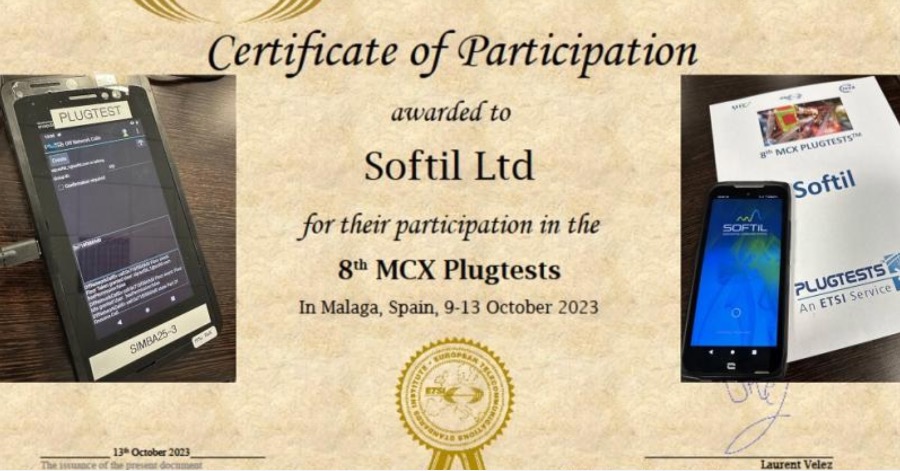
Softil’s BEEHD Framework has successfully participated in the first ever interoperability testing of 3GPP standards-based device-to-device (off-network) MCX communications using MCX devices leveraging Qualcomm’s 5G-Sidelink technology. Softil engineers employed its BEEHD Framework at ETSI’s latest Plugtest held on 9-13 October at Malaga, Spain to validate the interoperability of new MCX vendor products.
The ETSI MCX Plugtest #8 was focused on testing products with the latest functionality of 3GPP Release 17, FRMCS, eMBMS, Interworking function (IWF), direct mode and other features of 3GPP mission-critical communication standards.
Device-to-device communications … with or without network connectivity
During the Malaga Plugtest, the Softil team focused on one of the most critical MCX features – ensuring device-to-device communications. Device-to-device communications are essential for first responders and all other group communications users. The technology allows critical communications users to communicate when network connectivity is absent.
Until now, communicating when a network was down was only available on Land Mobile Radio (LMR) devices. However, Qualcomm’s 5G-Sidelink technology now allows devices to discover each other and communicate without network connectivity.
Softil, together with Alea, a Leonardo company, demonstrated the first ever interoperable direct mode communication at the Malaga plugtest using devices powered by Qualcomm 5G-Sidelink technology.
“By ensuring interoperability of MCX products and solutions, the industry spurs choice, economies of scale, confidence in the new technology and allows operators to choose best-of-breed solutions,” says Anatoli Levine, Director of Products & Standards at Softil and who also led the Softil team at the plugtest. “With complete interoperability of systems, First Responders from all blue light agencies working at an incident can communicate together at all times irrespective of MCX vendor products being used.”
Levine adds: “Once deployed, Qualcomm’s 5G-Sidelink technology will allow the complete transition from LMR to the latest public safety broadband technologies with the resulting benefits, notably the ability to work better and faster and beyond existing barriers.”
The event was hosted by the University of Malaga (UMA) and was attended by more than 115 delegates representing 31 MCX vendor companies and 20 observer organizations and staff.
Softil has participated in all MCX and FRMCS ETSI Plugtests since the first event was held in 2017 hosted by ETSI in Sophia-Antipolis, France. At every ETSI plugtest, a team of Softil engineers participate in product testing to improve the level of interoperability between open-standard based solutions developed by different vendors. Full interoperability of MCX products helps all vendors and customers to have a better, easier and faster route to deploy new mission-critical products. Relying on open standards and interoperability is crucial for public safety and other mission-critical communications sectors such as transportation, railways (FRMCS) and utilities and helps instill confidence in the new technology.
